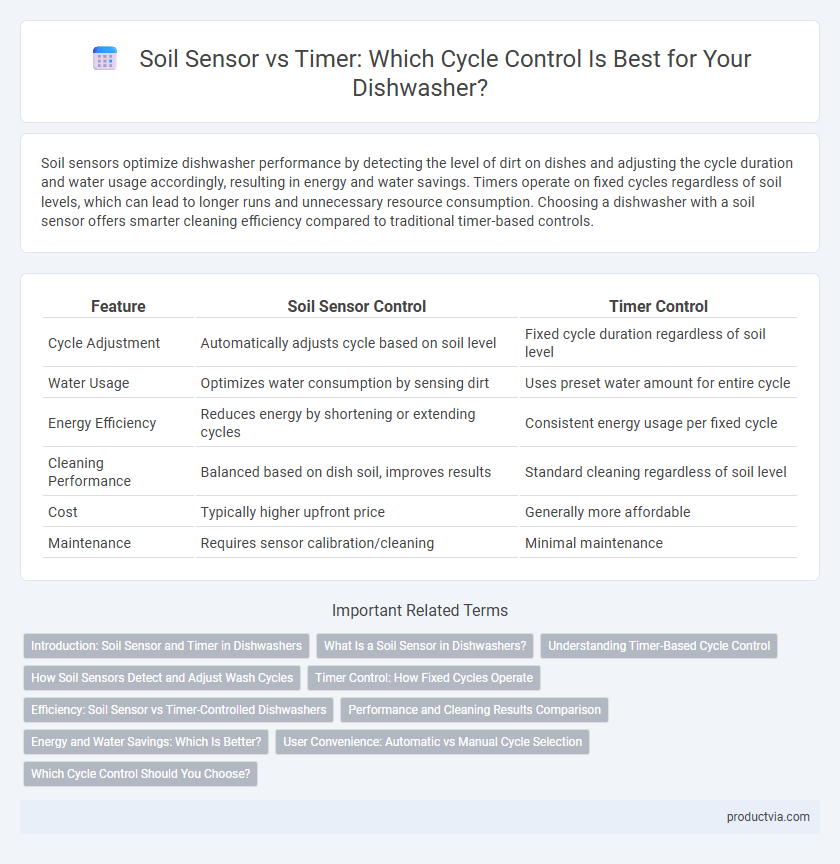Soil sensors optimize dishwasher performance by detecting the level of dirt on dishes and adjusting the cycle duration and water usage accordingly, resulting in energy and water savings. Timers operate on fixed cycles regardless of soil levels, which can lead to longer runs and unnecessary resource consumption. Choosing a dishwasher with a soil sensor offers smarter cleaning efficiency compared to traditional timer-based controls.
Table of Comparison
| Feature | Soil Sensor Control | Timer Control |
|---|---|---|
| Cycle Adjustment | Automatically adjusts cycle based on soil level | Fixed cycle duration regardless of soil level |
| Water Usage | Optimizes water consumption by sensing dirt | Uses preset water amount for entire cycle |
| Energy Efficiency | Reduces energy by shortening or extending cycles | Consistent energy usage per fixed cycle |
| Cleaning Performance | Balanced based on dish soil, improves results | Standard cleaning regardless of soil level |
| Cost | Typically higher upfront price | Generally more affordable |
| Maintenance | Requires sensor calibration/cleaning | Minimal maintenance |
Introduction: Soil Sensor and Timer in Dishwashers
Soil sensors in dishwashers detect the level of food particles and grease in the wash water to automatically adjust cycle duration and water usage, enhancing cleaning efficiency and energy savings. Timer controls operate on preset durations regardless of soil level, offering simplicity but potentially wasting water and energy on lightly soiled loads. Choosing soil sensor technology supports optimized cycle performance, while timer systems provide consistent but less adaptive wash cycles.
What Is a Soil Sensor in Dishwashers?
A soil sensor in dishwashers detects the level of food particles and dirt in the wash water to adjust the cycle duration and intensity for optimal cleaning efficiency. It uses optical or turbidity sensors to measure water clarity, ensuring that dishes receive appropriate cleaning without wasting water or energy. This technology contrasts with traditional timer-based controls that run fixed cycles regardless of soil levels, improving performance and resource savings.
Understanding Timer-Based Cycle Control
Timer-based cycle control in dishwashers operates by running wash cycles for pre-set durations regardless of soil levels, relying solely on a fixed schedule to complete cleaning. This method contrasts with soil sensors, which detect the dirtiness of dishes and adjust cycle length accordingly for optimized water and energy use. While timer controls are simpler and less expensive, they may lead to under- or over-washing, reducing efficiency compared to intelligent soil sensor systems.
How Soil Sensors Detect and Adjust Wash Cycles
Soil sensors in dishwashers use optical or conductivity sensors to detect the level of food residue and grease in the wash water, enabling real-time adjustments to the cycle duration and intensity. Unlike timer-based systems that follow a preset cycle regardless of cleanliness, soil sensors optimize water usage and energy consumption by extending or shortening the wash cycle based on detected soil levels. This intelligent detection improves cleaning performance, reduces wear on dishes and machine components, and minimizes resource waste.
Timer Control: How Fixed Cycles Operate
Timer control in dishwashers operates through fixed cycles predetermined to run for specific durations regardless of soil level, providing consistent washing performance. These cycles include stages such as pre-wash, main wash, rinse, and dry, each programmed to start and stop automatically based on the timer settings. Timer-controlled dishwashers are generally more affordable but may consume more water and energy compared to soil sensor models that adjust cycle length based on dirt detection.
Efficiency: Soil Sensor vs Timer-Controlled Dishwashers
Soil sensor dishwashers optimize efficiency by automatically adjusting water usage and cycle duration based on the cleanliness of dishes, significantly reducing energy and water waste compared to timer-controlled models. Timer-controlled dishwashers operate on preset cycles regardless of soil level, often leading to unnecessary resource consumption. By adapting to real-time soil detection, soil sensor systems enhance cleaning performance while minimizing operational costs.
Performance and Cleaning Results Comparison
Soil sensor technology in dishwashers detects the level of food residue on dishes, adjusting cycle duration and water usage for optimal cleaning performance, resulting in superior stain and grease removal compared to timer-based systems. Timer-controlled cycles operate on preset durations regardless of soil levels, often leading to either insufficient cleaning or wasted energy and water. Studies show soil sensor dishwashers enhance cleaning efficiency by dynamically optimizing resources, improving overall cleaning outcomes and reducing environmental impact.
Energy and Water Savings: Which Is Better?
Soil sensors in dishwashers adjust the cycle length and water usage based on the dirtiness of the dishes, leading to significant energy and water savings compared to timer-based systems that run fixed cycles regardless of soil levels. Studies show soil sensor-equipped dishwashers can reduce water consumption by up to 30% and energy use by approximately 25%, whereas timer models often result in unnecessary resource use. Energy-efficient households benefit more from soil sensors due to optimized cycle control tailored to actual cleaning needs.
User Convenience: Automatic vs Manual Cycle Selection
Soil sensors in dishwashers automatically adjust wash cycles by detecting the dirt level on dishes, enhancing user convenience with precise, hands-free cleaning. Timers require manual cycle selection and fixed durations, which may lead to inefficiencies or over-washing. Automatic soil sensor technology optimizes water and energy use while reducing user input, promoting smarter and more intuitive dishwasher operation.
Which Cycle Control Should You Choose?
Soil sensor technology offers precise cycle control by detecting the level of food residue on dishes, optimizing water and energy use for efficient cleaning. Timer-based control runs a fixed duration regardless of soil level, potentially leading to overuse of resources or insufficient cleaning. Opting for a soil sensor cycle control enhances performance and sustainability by tailoring the wash cycle to actual dish conditions.
Soil Sensor vs Timer for Cycle Control Infographic

 productvia.com
productvia.com